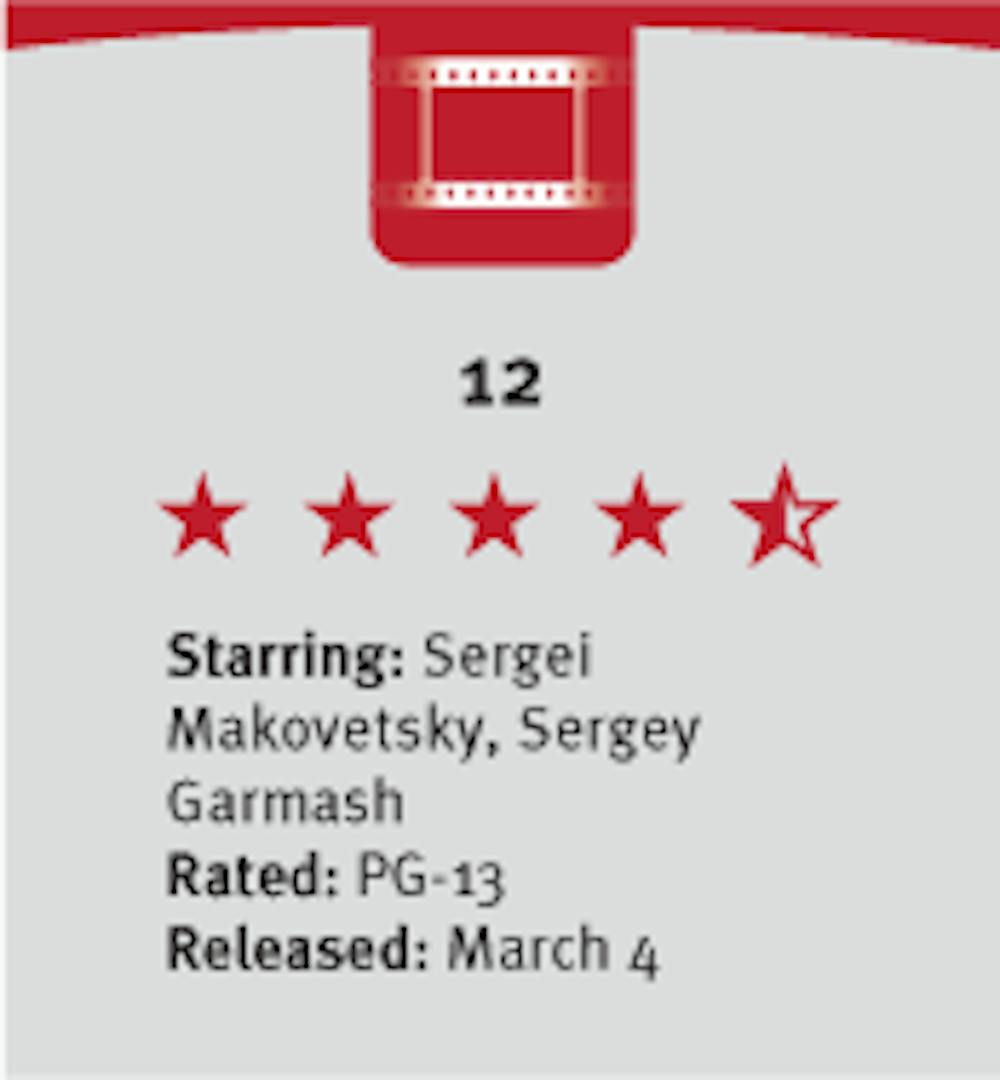Mikhalkov's dirty dozen

It takes guts to remake one of the greatest movies of all time, but 12, a new Russian retelling of the classic 12 Angry Men, brings interpretive daring to a new level. The plot is the same as the original - a jury votes on a suspect who appears to be guilty, but a lone dissenter changes all their minds - yet the movie bursts out of the confines of the American original, throwing in battle scenes, drug addictions and contemporary political statements to make a film that is thoroughly entertaining.Some film critics are unhappy with the changes, which take a classic movie where the camera almost never left the jury's deliberation room and turns it into a big, long, loud epic. But these critics fail to understand that this is not a remake; rather, it is a start from scratch, from a distinctly Russian point of view dealing with distinctly Russian problems. Although 12 does lapse into cliché and heavy-handed symbolism at times, it is as powerful as the American classic on which it is based.
For director Nikita Mikhalkov, 12 is ultimately a political statement. Its alleged message is embodied in quotations which appear at the beginning and the end, juxtaposed with a symbolic shot of a dog running through the rain. The political message is dubious, as Mikhalkov is a noted supporter of Vladimir Putin.
But in terms of style, these political moments are the worst parts of the movie: They are unnecessary, obvious and, frankly, distracting. Even more unfortunate is that one of the most pretentiously symbolic scenes has been filtered to be black-and-white, making the white subtitles impossible to read. This poor political preaching forms a frame to the movie by taking up only the very first and very last scenes.
Fortunately, everything within that frame is outstanding. Like the original, 12 takes place almost entirely in one room, relying on great acting and great directing for success. Luckily, it receives both. The actors on the jury are so uniformly perfect that the movie could almost be a master class in theatrical performance. The jurors work in perfect ensemble, and the monologues entrusted to each one are delivered with impressive power.
The jury's arguments are interrupted regularly by unsettling scenes from the childhood of the accused, whose parents were murdered by Chechen rebels. These scenes are effective enough to justify the departure from the 12-actors-in-one-room formula, and original enough that within a few scenes we realize that 12 is not so much a remake as a new creation based on an old idea.
Other innovations make the movie interesting too, like the fact that the courthouse is under renovation and the jurors have to meet in an elementary school gym.
One weakness of the original 12 Angry Men is that it featured a venomous juror who proclaimed the defendant's guilt with almost evil enthusiasm, and who collapsed into tears when he finally had to admit he would vote to acquit. In the older movie the scene in which he changes his mind was horribly fake and poorly executed. By contrast, the scene in this movie in which the cruel juror recants is maybe the best-acted, best-written and best-directed moment of all.
12 offers another innovation which makes it particularly exciting. Mikhalkov also acts as the jury's foreman, a silent, impartial presence until the final scene, in which the jury finally decides to find the defendant not guilty. The foreman then adds a stunning twist to the plot, one which gives the movie a whole new level of moral complexity. It is the capstone to a brilliantly acted series of deliberations.
The movie's greatest stroke, though, is its bleak view of the human art of persuasion. Almost none of the 12 jurors are convinced of the defendant's innocence for logical reasons, not even the hero who voted "not guilty" at the very start. Most of the characters side with the suspect because they sympathize with him, because something in their life story reminds them of his plight or because another juror made a particularly moving speech.
Mikhalkov is disappointed by the fact that the verdict in a murder trial is most affected by empty emotional pleas and the personal lives of the jurors. The lone man who believes in the defendant's innocence understands this aspect of human nature from the start. If he had tried to convince the other 11 jurors using logic and hard facts alone, those 12 Russians would still be in that
More from The Rice Thresher

Over 1,000 students petition against new meal plan
When Konstantin Savvon opened the Housing and Dining email announcing the new unlimited meal plan, he was instantly concerned about the impact on off-campus students like himself.

Rice football wins season opener under new coach
For the first time since 2018, Rice football opened its season with a victory. Scott Abell was soaked with yellow Powerade following a 14-12 win on the road Saturday against the University of Louisiana at Lafayette, which won 10 games and made it to the Sun Belt Conference championship last season.

Acting like an athlete: Rice basketball alum takes on Broadway
Underneath Chadd Alexander’s Broadway costume, there’s ankle tape and wrist braces — same protective gear he wore as a walk-on basketball player at Rice, though now he’s performing eight shows a week in the ensemble of “Harry Potter and the Cursed Child” instead of running conditioning drills in Tudor Fieldhouse.

Please note All comments are eligible for publication by The Rice Thresher.